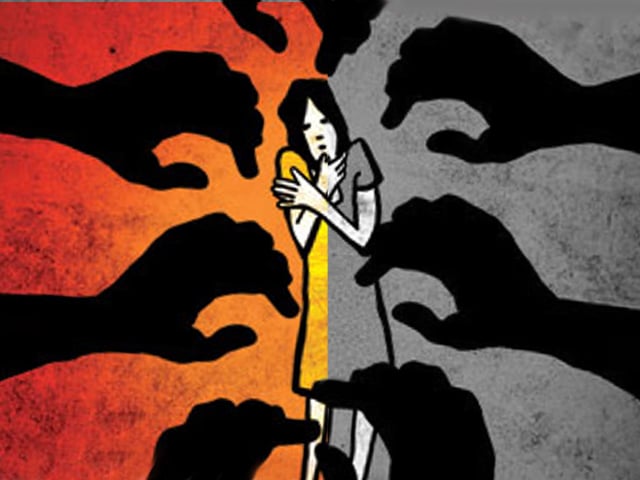
Does 'Taroo Maroo' really promote paedophilia?
Pir made a funny video about civilised behaviour, not a public service announcement about dangers of child molesters!
A blog in The Express Tribune written by Ayesha Asghar (@ashsultana on Twitter) argues that Ali Gul Pir's video Taroo Maroo, about the Pakistani man's vulgar habit of staring at anyone and everyone, anything and everything in a way that makes you feel as though he’s just raped you with his eyes, promotes paedophilia.
The few seconds of the video in question show Ali Gul Pir’s “maila” bragging how he’ll stare at a goat, a job, a car, a building - and a bachi. The Urdu word for bachi literally means little girl, but in slang, it also means a young woman or a girlfriend. In the video, the moment Pir says “Bachi bhi taroonga” the camera cuts to a small girl staring blankly up at the camera.
Asghar argues that when dealing with issues of child sexual abuse, utmost care should be taken to portray those issues with sensitivity and awareness. She says that by including the image of the young girl and pairing it with the activity of staring, Ali Gul Pir is tacitly approving paedophilia. She also writes that the message of the video would have been just as effective without the image of the child included.
The comments responding to the blog argue that the video is meant to actually highlight this uncouth behaviour in our society and mock it with satire. They also note that nobody complained when Ali Gul Pir’s previous video “Waderai Ka Beta” showed the useless activities of the feudal class; it was understood the video was social satire, not approval of those activities.
Is Ali Gul Pir going too far with the imagery in “Taroo Maroo”?
Ayesha Asghar thinks that he is. Because so many people idolise him (I’m not sure that’s really true, but we’ll go with it), they might think to emulate his behaviour in the video, she argues. And she says that joking about staring at children does much to desensitise the population to the issue of child sexual abuse.
I’ve seen the video and I have a hard time thinking of it as anything other than satire.
Anyone who thinks it is an instructional video on how to go around staring at people is taking it at a very literal level. Anyone who becomes uncomfortable with the visual of the child being stared at is being forced to confront the lack of boundaries we have in our society when it comes to permissible behaviour.
I’m not sure how many people will watch this video and take up the past-time of staring for no good reason at goats, dogs, buildings, or jobs. If anything, they would probably check themselves (for a little while, at least) to make sure that they weren’t staring inappropriately at anything, until they forget about the video and go back to their normal habits of intense visual examination of both animate and inanimate objects.
Again, I don’t remember droves of people suddenly deciding they wanted to be feudal after the success of “Waderai Ka Beta”.
As for desensitising people to the issue of child abuse, or making them think that it’s acceptable to laugh about the issue, this is based on the assumption that the video is implying the starer is about to sexually abuse the little girl in question – a false assumption, in my opinion.
We’re unsure with what intent the starer is staring at the child; idle curiosity, boredom, or criminal intent?
It’s my guess that Ali Gul Pir attempted to make a humorous, entertaining video about rudeness and civilised behaviour, not a public service announcement about the dangers of child molesters.
On the other hand, I am reminded of how in the past I have objected to the use of the word “bachi” as a signifier of a sexually attractive girl or woman for much the same reason as Ayesha Asghar outlines in her blog; it blurs the lines between pre-pubescent girls, teenagers, and grown women. But I was told very firmly that there was no harm in it; that it was the same thing as people calling their loved ones “baby”, and that I shouldn’t be so “uptight” or “westernised” in my outlook.
What Ali Gul Pir’s video does is make a clever play on the word “bachi” and pair its literal meaning visually with its slang meaning aurally. This results in the cognitive dissonance that we experience when we see the video and listen to the song; we know that a little girl is off-limits sexually but we’re hearing a slang term that many of today’s youth think is acceptable to use.
It makes for a very uncomfortable experience as we’re forced to rethink a concept we’ve already deemed “safe”. There is resistance to it, and a certain amount of shame or horror as we realise what we’ve allowed ourselves to do; unwittingly imply that a small girl is fair game.
This is where the slippery slope towards paedophilia starts; paedophiles impart sexuality to a child that is not physically, emotionally or mentally mature enough for sexual activity.
I’m not sure if Ali Gul Pir knew what he was doing, but it’s important that he did it, if it makes us have this conversation.
This post originally appeared here.
Read more by Bina here or follow her on Twitter @BinaShah




COMMENTS (32)
Comments are moderated and generally will be posted if they are on-topic and not abusive.
For more information, please see our Comments FAQ